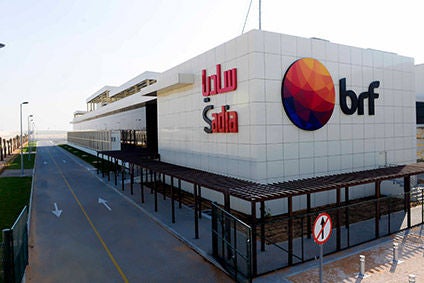
The World Trade Organization’s Committee on Sanitary and Phytosanitary Measures was notified of the draft regulation on 6 May via a circular from the Saudi Arabia Food and Drug Authority laying down the country’s intentions to change the expiration date on frozen chicken products applicable from the date of slaughter.
WTO member countries that could be impacted by the decision have 60 days to respond with comments to the proposed change, a period that will expire on 5 July.

Discover B2B Marketing That Performs
Combine business intelligence and editorial excellence to reach engaged professionals across 36 leading media platforms.
BRF issued its first-quarter results to 31 March yesterday (12 May) in which it commented on the proposal from Saudi Arabia: “The company has no means yet to measure the potential operational, economic and financial impact, in case [the] measure is maintained by the Kingdom of Saudi Arabia. The effects are being evaluated in connection with the competent authorities for the adoption of possible applicable measures, in line with the WTO’s covered agreements on the application of sanitary and phytosanitary measures and technical barriers to trade.”
The company’s CEO, Lorival Nogueira Luz Jr., offered additional comments on a follow-up conference call, noting the regulation could affect its chicken sales to Saudi Arabia in the short term and is therefore seeking a compromise.
“That absolutely has an impact and could have a greater impact on our exports considering the time lag between production and outbound shipments and distribution of products,” Luz said.
He continued: “We expect to establish a conversation with their government. And we expect to reach a compromise.”

US Tariffs are shifting - will you react or anticipate?
Don’t let policy changes catch you off guard. Stay proactive with real-time data and expert analysis.
By GlobalDataBRF reported revenue of BRL10.5bn (US$1.9bn) for the quarter, an increase of 18.4% over the corresponding period a year earlier. Adjusted EBITDA dropped 1.4% to BRL1.2bn.
Consolidated net income turned to a BRL22m profit from a BRL38m loss a year earlier.





